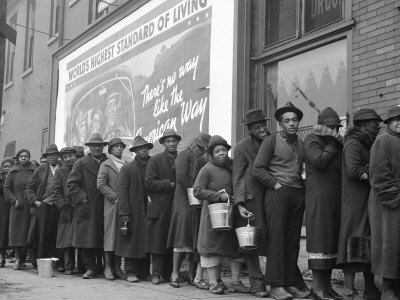Alone in the African diaspora: why African Americans need more solidarity

The author writes about double marginalisation faced by Africans in the diaspora, especially those living in the United States of America.
I looked at the sign posted beside the ticket booth, somewhat confused. 5,200CFA (US $9) for non-Africans, 2,700CFA (US $5) for non-Senegalese Africans, and 1,500CFA (about US $3) for Senegalese adults to take a ferry to Gorée Island—the island housing the last slave outpost in Senegal. The prices indicated the commodification of one of history’s most tragic events and a violent distinction between those whose ancestors passed through Gorée Island into chattel slavery and those whose ancestors remained in Africa.
Slave fortresses like the one found on Gorée brutally contributed to the expansion of the African diaspora. There was no price reflecting this reality. What I saw instead reflected the ways in which spatiality and capitalism combine to create a cognitive dissonance that sustains discord and alienation across the diaspora. The difference in fees represents both a real and imagined sense of global economic privileges that could stand to be further complicated. My own experiences as an African American being called toubab, nassara, obroni, mzungu(all mean white) during my travels around Africa reinforced a sense of detachment from this thing we call “the diaspora”. Where are the examples of Pan-Africanism in our day-to-day activities?

The effusive outpouring of anger, resentment, confusion, and defeat are embedded in the African American experience. They resurfaced more recently with the onslaught of terrorism and anti-blackness that is woven in the American tapestry. In Kentucky, two African Americans were killed while shopping in a grocery, targeted for nothing other than their phenotype. Just before shooting the African American man and woman, the white, male gunman tried to enter an African American church. This could have been a repeat of what took place in 2015 in Charleston, South Carolina where a white, male gunman opened fire on a Black church, killing nine people.
The American political context cultivates anti-black rhetoric and action. During the campaign season for the 2018 mid-term elections, candidates facing African American opponents in former-slave owning states mobilised their bases by using racist, and fear-mongering discourse. Stacey Abrams, running to become the first African American female governor in the history of the country faced an opponent whose supporters sent robocalls to Georgia constituents calling Abrams and Oprah Winfrey various racial and sexualised slurs [1]. Just south of Georgia, Andrew Gillum, running as the first African American candidate for Governor in the state of Florida, campaigned through an onslaught of racial epithets from his political opponent [2].
The mid-term elections highlighted what many African Americans know and experience daily—a necessary trepidation in the way we live our lives. Or, as Dubois put it, “That is the hell of it. Imagine spending your life looking for insults or finding hiding places from them—shrinking (instinctively and despite desperate bolstering of courage) from blows that are not always, but ever; not each day, but each week, each month, each year”[3].
Dubois is a useful historical and contemporary bridge between the cost of traveling to Gorée Island as a Diasporic African and the 2018 Mid-term elections. His life and work undergird my main point: in a global context where the nation-state is the single most important political construct, where do African Americans turn for solidarity and protection against the rampant anti-blackness that continues to animate socio-economic and political commentary in America?
There is a long history of solidarity in the African diaspora, from Ghana offering dual citizenship to Africans in the diaspora to TransAfrica Forum spawning the United States movement to back Black South Africans in their fight to end apartheid. There were also the well-known Pan-African Congresses from 1919 to as late as 2014, which provided international space for people of the African diaspora to collaborate on solutions for ending global and domestic systems of oppression. Still, the solutions are almost-always situated in the context of the nation-state. For people of African descent living in settler-states, our political and economic struggles are exacerbated by what Dubois calls “double-consciousness”.
Living in nation-states where the “nation” is predicated on an anti-black identity requires that we operate with multiple identities that are anathema to each other.
Those of us that construct a portion of our identity based on a Pan-African ideology feel the constant pull between our commitments to a world that transcends the nation-state and the immediate powers and privileges that emanate from the nation-state. Because of America’s position as a global hegemon and attempts at empire, the putative assumption across the rest of the diaspora is that African Americans equally reap the spoils from America’s military and capitalist expansion. And, to some extent, this is true.
However, these “benefits” (if you will) are coterminous with America’s inverted totalitarianism and anti-black machinations. For example, with a gross domestic product of US $ 19.39 trillion and a median income of roughly US $ 59,000, the United States has the highest incarceration rate in the world. In 2013, African American men made up 37 percent of the country’s incarcerated population. Or, in this same country, Black women are dying at three times the rate of white women after giving birth [4]. In the face of a subtle and prolonged genocide against Blacks in the United States, where do African Americans turn for solidarity and protection?
* Doctor T.D. Harper-Shipman is an Assistant Professor of Africana Studies at Davidson College in the United States of America.
Endnotes
1. https://www.cnn.com/videos/politics/2018/11/06/stacey-abrams-racist-robo...accessed on 23 November 2018
2. https://www.tallahassee.com/story/news/politics/elections/2018/11/06/his...accessed on 23 November 2018
3. W.E.B. Dubois, (1920), Darkwater: Voices from within the Veil
4. https://www.npr.org/2017/12/07/568948782/black-mothers-keep-dying-after-...accessed 23 November 2018.
